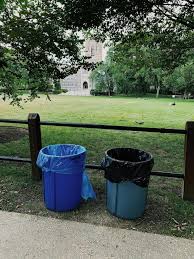This lackluster response is not surprising. On campus, overflowing trash cans are the norm as students continue to pile. The clothing donation bills never seem to empty as well.
An excess of food in each of our dining places is thrown away, along with the plastic container the food came in. The sprinklers water a small radius and, in some cases, the sidewalk. There seems to be a culture of excess here at Fordham, one that is harmful to the environment.
Is the administration or Fordham students more to blame? The student acts while the administration sets the atmosphere. We at The Fordham Ram argue that each part of the Fordham community can and should step up to make our campus more environmentally friendly.
In this political climate, the environment needs our protection and help more than ever. President Donald J. Trump plans to cut the Environmental Protection Agency’s budget. The bumblebee is officially on the endangered species list. The North Dakota Access Pipeline is in use after months of protest. Our February here in New York was warmer than Februarys should be (as enjoyable as it was).
We at The Fordham Ram praise the actions United Student Government (USG) has taken to combat the environmental inaction here at Fordham. The Sustainability Committee hosted Sustainability Week this past October, which included an acoustic concert, a celebration of Himalayas Days and a screening of the documentary “This Changes Everything.”
Facilities have purchased five recycling bins and stationed them around Eddy’s for the current semester. The dining services have two new environmentally friendly initiatives. Meatless Mondays began in the cafeteria this semester, and, according to the Midyear Report from USG, dining services may begin composting. We applaud these efforts by USG and the cooperation with our different organizations on campus.
However, there are always more actions we can take to improve our living spaces. We still have a long way to go in order to combat these issues, and both the students and the administration should take action. Fordham administration and students should work together to affect change.
Education on how to recycle properly and even implementation of environmentally conscious food would significantly improve the environmental culture on campus.
We also encourage students to empower your Sustainability Vice President of USG to continue USG’s efforts and increase the committee’s popularity.
These methods could contribute to less of a culture of excess and more to one of environmental conscience, so future generations of Rams can enjoy green spaces and more stable climates.





